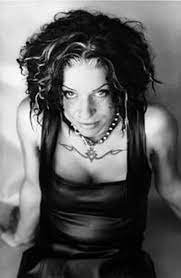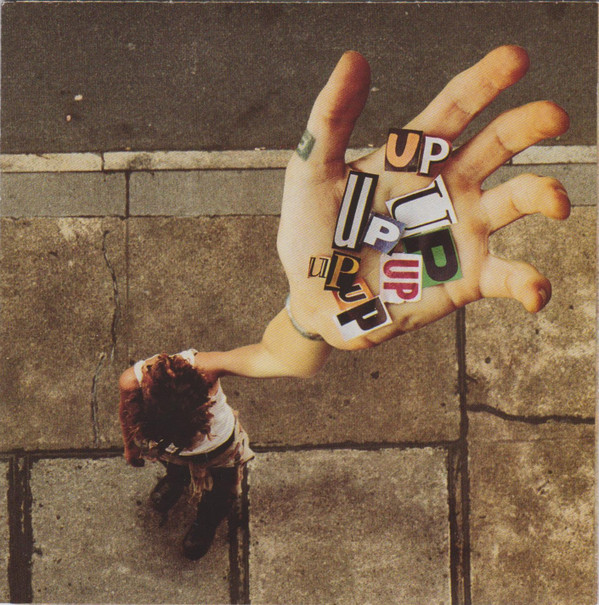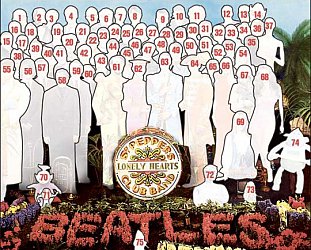Graham Reid | | 5 min read

Maybe it's because she laughs often at herself, but Ani DiFranco is someone you warm to quickly.
First up she asks if it's a decent hour in New Zealand for me to be talking to her and seems genuinely relieved when I reassure her. And you, Ani?
"Oh yeah, fine. I'm just sitting here in Buffalo, New York. It's my home town and I live here once again. I'm actually living a block from where I was born in the hospital," she laughs. "It's quite pathetic, really. I haven't gone very far."
Which isn't true of course.
DiFranco, a singer-songwriter and decade-long businesswoman heading her own Righteous Babe label, has gone from the coffee house circuit to the front page of music magazines and, with her latest album Up Up Up Up Up Up (that's five more than REM's and Peter Gabriel's Up albums), onto the feature pages of Billboard, the bible of the music industry.
 DiFranco's is a success story of a modest kind but the audience for her intelligent, rock-framed and often innovatively produced music has grown incrementally over the past 10 years.
DiFranco's is a success story of a modest kind but the audience for her intelligent, rock-framed and often innovatively produced music has grown incrementally over the past 10 years.The album before 6Up - the excellent Little Plastic Castle - sold an impressive 250,000 Stateside with negligible radio play and no MTV coverage. But that's only half the story, maybe even less than half. As always, DiFranco sold her album through her 50,000-strong mail-order list, at gigs and women's bookshops.
"Commercial radio is such a closed system if you're not part of the industry, and I'm not really part of that club. My audience is based on constant touring and it's a big world full of bars, clubs, coffee houses and theatres and that's basically where I've been living. It takes a little longer, but I've enjoyed the ride."
That ride has taken her through a remarkable series of albums - including working with eccentric raconteur Utah Phillips and releasing a much acclaimed double live Living in Clip two years ago - and currently onto soundtracks for My Best Friend's Wedding and The Jackal.
She is hugely amused at the changing music industry perception of women performers and record company execs belatedly recognising women are a monied audience: "You think they would have learned that with the Beatles," she laughs.
"If it wasn't for 13-year-old girls ..."
And in the pre-Alanis years she was certainly a target of their, sometimes unwelcome, attention.
"I was making records before the most recent surge of `riot grrrls' and angry women and all the new industry hype. There were certainly enough record companies along the way who thought, `here's a readymade chick, with an attitude and an audience ...' So they all dangled their carrots.
"But it's funny the culture is still using phrases like `women in music.'
However, that kind of hype, even if it is just a business capitalising on a culture movement already occurring, does broaden the vocabulary.
"I notice now that when I walk into a guitar store there are teenage girls everywhere. I remember when I first started playing it was terrifying to walk into a guitar store and those long-haired metal guys would treat you like you didn't know what you were talking about - which I didn't. But now that seems to be changing."
DiFranco is changing too. 6Up finds her experimenting more in the studio and "the crazy sounds occurred on the album because of the old microphones and me experimenting with putting vocals through amplifiers and getting different organic sounds in the process.
"Also I'm stepping outside the traditional song structure of verse-chorus that comes with this culture we're all raised on. On Up I'm experimenting with blowing that structure open."
 She admits she's a huge fan of producer Mitchell Froom's protege Tchad Blake (who, with Froom, engineered clanking Tom Waits albums and Suzanne Vega's more sonically experimental work) but says she works "instinctually, not really trying to do anything."
She admits she's a huge fan of producer Mitchell Froom's protege Tchad Blake (who, with Froom, engineered clanking Tom Waits albums and Suzanne Vega's more sonically experimental work) but says she works "instinctually, not really trying to do anything.""I also tend to make records pretty quickly and I wouldn't make as many as I do if I obsessed or strove for the perfection that maybe I should. I'm more interested in just playing and experimenting."
All of which makes her recent work harder to replicate live although, to great gales of laughter, she says: "I have a terrible memory so I'm constantly forgetting lyrics. So half the spontaneity live is due to forgetting lyrics, probably from my being dropped on my head as a child.
"On stage you are limited by one mike and one room to play to, but that challenge is really inspiring. You are trying to create something out of nothing and you have to use fewer people and it's mostly about interaction and responding and being the catalyst for things.
"It's one thing to give someone a whole pile of flammable material and big pile of brush and say `light a fire,' but it's another to put somebody in the woods with two sticks."





post a comment